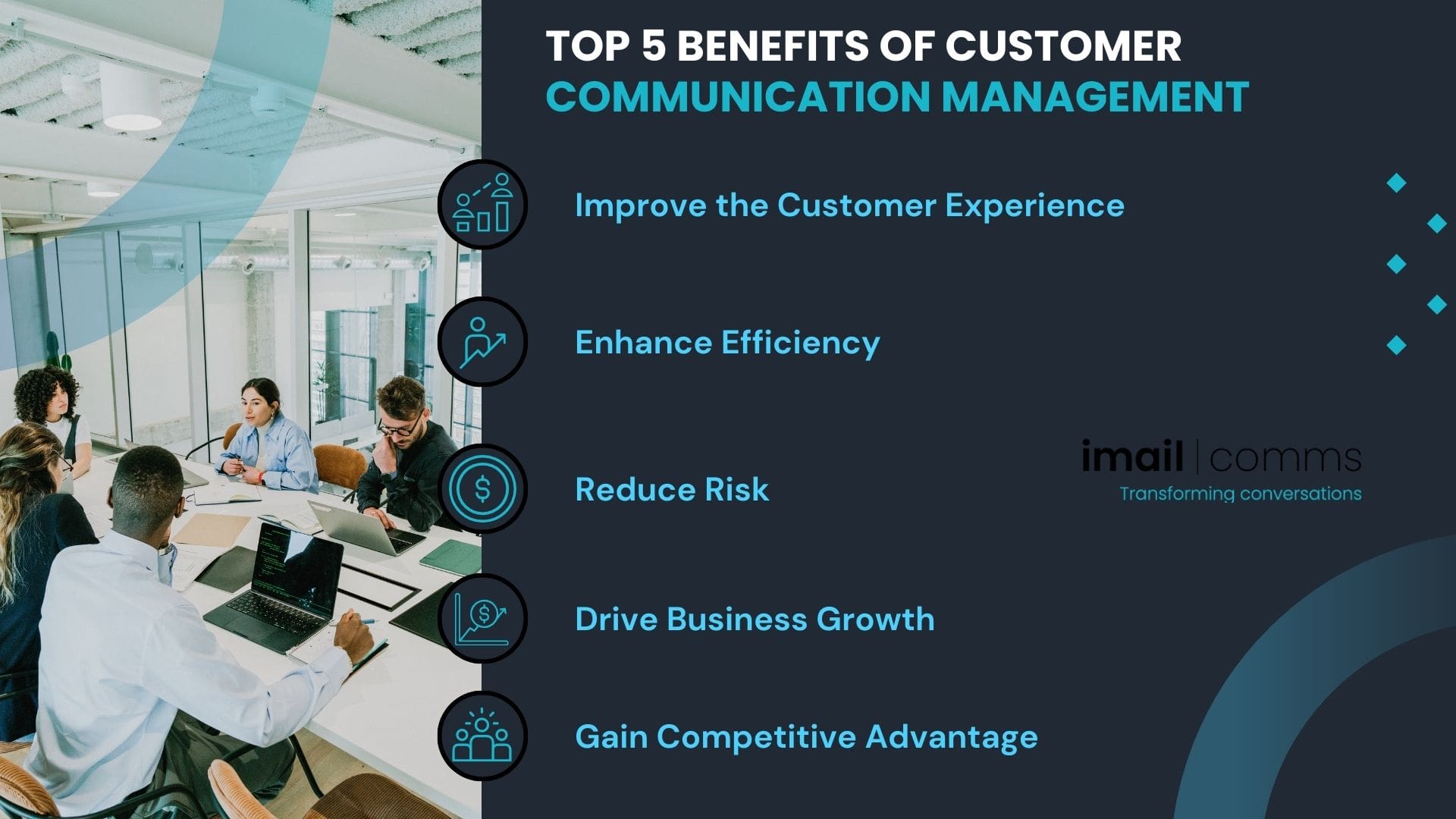What Is Customer Communication Management?
Customer Communication Management, or CCM for short, is all about improving the customer experience.
It’s all about handling how you talk to your customers — ensuring every message is consistent, effective, and tailored just for them.
An Introduction To Customer Communications Management
Today, digital technology changes things faster than ever. That’s why Customer Communication Management (CCM) is so important. It helps businesses connect with customers across many channels while keeping their brand message clear and consistent.
Integrating a customer communication management system with your existing systems is key to growing strong relationships with customers in our modern world.
Why Is It Important?
Customer Communication Management (CCM) is essential for a multitude of reasons:
- It ensures your message is the same across all platforms, which is super important in our world of many different communication ways.
- CCM improves customers’ experiences by creating stronger, more personal relationships through custom messages. Happy customers mean loyal customers.
- Also, CCM makes your communication processes more efficient, saving money and keeping your customer engagement top-notch.
The Fundamentals
CCM is about using different ways to talk to your audience, not just sending messages.
It’s about creating a whole communication strategy that people really connect with. Getting the basics right is the first step to making the most of CCM.
-
Key Parts Of Effective CCM
Effective CCM comprises several key elements:
Multi-channel communication: Utilising email, SMS, physical mail, etc.
Customer data analysis: Understanding customer behaviour and preferences.
Personalisation: Tailoring messages to individual customers.
Automation: Streamlining repetitive tasks for efficiency.
Compliance and security: Making sure all communications adhere to legal standards.
-
Combining Digital and Traditional Communication
CCM effectively merges digital and traditional forms of communication. This means businesses can reach customers in the ways they like best, whether through emails, SMS, or good old-fashioned direct mail.
-
Using Customer Data in Communication
Using customer data well is a big part of CCM. It means looking at how customers interact with you and using that info to make better communication strategies. This way, your messages are more likely to hit the mark.
-
Building Relationships Through CCM
CCM is great for building long-term relationships with customers. Regular, valuable, and personalised communication helps turn one-time buyers into loyal fans.
-
Safety and Compliance in Communication
In CCM, making sure communication is safe and follows the law is really important. This means sticking to data protection rules and keeping customer information private.
-
Making Messages Personal
The heart of CCM is personalisation. It’s about understanding what your customers need and want and creating messages that meet those needs. This not only makes the customer experience better but also makes your communication efforts more effective.
-
Making Communication Efficient
Efficiency in CCM comes from automating tasks and using different tools together. This means less chance of mistakes and making sure customers get timely, consistent messages.
-
Assessing CCM Success
It’s crucial to see how well your CCM is doing. Look at customer engagement, happiness, and response rates and how they affect your business goals. Regular checks help you tweak your strategy for better results.

An Introduction To Customer Communications Management
Top 5 Benefits of Customer Communication Management
Let’s get into some of the benefits:
1. Improve the Customer Experience
CCM lets us deliver highly personalised communications, significantly improving the customer experience. Utilising customer data to customise messages ensures each interaction is relevant and engaging, thereby boosting customer satisfaction and fostering loyalty.
2. Enhance Efficiency
Using CCM tools streamlines communication processes, enhancing efficiency. Automation of routine tasks and integration of various communication channels reduce the time and resources required to manage customer interactions, leading to improved operational efficiency.
3. Reduce Risk
CCM systems play a crucial role in mitigating communication-related risks. This includes minimising errors in customer communication, ensuring adherence to data protection regulations, and maintaining consistent messaging. Effective management and monitoring of customer communications reduce the risk of misunderstandings and potential legal complications.
4. Drive Business Growth
Happy customers tend to come back and tell others about you. Insights from CCM can help you spot new business opportunities and better understand customer needs, leading to more effective marketing strategies and product development. This customer-centric approach drives both retention and acquisition, fueling business growth.
5. Gain Competitive Advantage
Using the latest CCM tech sets you apart from the competition, appealing to customers who value digital smarts and new ways of interacting. It enables businesses to be more agile and responsive to market trends, enhancing customer engagement and loyalty. This technological edge is key in today’s fast-paced business environment.

How To Get Started
Starting with CCM can really change how your business interacts with your customers. Here’s how to get going:
-
Look At Your Current Communication Channels:
Take a good look at how you currently interact with customers across multiple channels, including digital interactions such as web pages, emails, and social media. Understanding your existing communication pathways is crucial for effectively integrating a CCM system.
-
Fit CCM with Your Business Processes:
Getting your CCM system to play nice with your everyday business processes is key. It’s all about making sure it works well with things like your Enterprise Resource Planning (ERP) systems. This alignment is essential for seamless operation and maximising the benefits of both systems.
-
Focus on Customer Experience Management:
Design your CCM strategy with a strong focus on customer experience management. Consider how the CCM system can enhance each touchpoint in the customer journey, ultimately driving customer loyalty.
-
Train Your Team:
It’s crucial that your team knows how to use the CCM system like pros. They need to be savvy about using it to communicate across different platforms effectively.
-
Monitor and Adapt:
Continuously monitor the performance of your CCM system. Be prepared to adapt and make changes to improve customer interactions and maintain alignment with evolving business needs.
About Us: iMail Comms
Established in 2008 as part of UK Mail PLC, we have evolved to become the UK’s leader in Customer Communication Management (CCM) for a diverse range of clients, including small, medium, and enterprise-level organisations and the Public Sector.
Our operations, which handle over 10 million A4 images monthly and cater to over 20,000 customers, are a testament to our capacity and commitment to excellence. Our team, led by co-founder and CEO Andy Barber, embodies a culture of innovation, support, and determination to excel.
Join us at iMail Comms as we continue to lead the way in Customer Communication Management. We combine the best of traditional and digital communication to meet and exceed our clients’ evolving needs.
Wrapping Up
In conclusion, Customer Communication Management (CCM) is a cornerstone of modern business communications. Its role in ensuring consistent, personalised, and efficient customer interaction cannot be overstated.
As we have explored, CCM can make your customers happier, turn them into loyal fans, streamline how you work, and even save you some pennies. It’s pretty clear that getting your CCM strategy spot on is a must-have for any business that wants to stay ahead of the game.
What’s Next In The Future Of CCM?
The future of Customer Communication Management (CCM) is set to be dynamic, driven by advancements in artificial intelligence (AI) and machine learning. These technologies are expected to introduce enhanced personalisation and efficiency, with predictive analytics enabling more customised communication strategies.
The trend towards omnichannel communication will also likely persist, requiring advanced CCM solutions capable of seamlessly integrating various communication channels. The growing emphasis on data-driven insights will further cement the role of CCM in strategic business planning. For business leaders, keeping pace with these developments will be key to maintaining a competitive edge in customer engagement and satisfaction.
Learn more on: Customer Communication Management Strategy in 2024 | CCM Challenges: What are They?
FAQs
Let’s answer some of your most frequently asked questions about exactly what is customer communication management:
What Is The Difference Between CRM And CCM?
Customer Relationship Management (CRM) and Customer Communication Management (CCM) both play crucial but distinct roles in customer relations. Customer Relationship Management (CRM) is all about managing everything to do with your relationships and interactions with customers. On the other hand, Customer Communication Management (CCM) zeroes in on managing and making the most of all the ways you talk to your customers. CCM is about making sure your conversations are engaging and clear and really speak to your customers as part of their wider journey with you.
Learn more on: CRM & CCM: What’s The Difference? | Customer Communication Management Simplified | How To Choose The Best CCM Software?
What Is Meant By Communication Management?
Communication management refers to the systematic planning, implementation, monitoring, and revision of all communication channels and methods within an organisation and between the organisation and its external audiences. In the realm of customer communication management, this involves strategies such as automated customer communication and developing a comprehensive customer communication strategy. This is pivotal for a customer service team in enhancing customer engagement and satisfaction.
How Does CCM Integrate With Other Business Systems?
CCM solutions are made to smoothly integrate with existing business systems, such as CRM, ERP, and marketing automation tools. This integration enables business users to maintain consistent and effective communication with customers. It helps consolidate data and insights from various departments, providing a unified view of the customer to business leaders, which is essential for making informed decisions and tailoring the customer journey.
What Role Does Data Security Play in CCM?
Keeping data safe in CCM is important, especially when automated systems handle sensitive customer info. Sticking to data protection laws and keeping this info confidential is key. It keeps your business safe from any data troubles and legal headaches and builds trust with your customers, making sure they know you’re serious about keeping their info safe.






Leave A Comment
You must be logged in to post a comment.